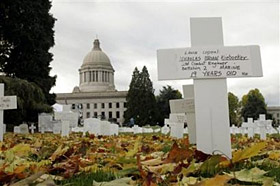 |
 |
 |
 Editorials | October 2005 Editorials | October 2005  
VA Seeks to Punish Iraq War Veterans
 Gene C. Gerard - t r u t h o u t Gene C. Gerard - t r u t h o u t


| | A cross bearing the name of Nicholas Kieboeker, stands on the lawn of the Capitol in Olympia, Wash. Nearly 2,000 crosses and tombstones were placed on the Capitol lawn Sunday and Monday by the group 'Veterans for Peace' as a memorial to U.S. military service men and women who have died in the Iraq War. (AP Photo/Ted S. Warren) |
The Veterans Affairs Department is currently reviewing approximately one-third of the cases of veterans who are receiving disability benefits for post-traumatic stress disorder (PTSD). After conducting an internal study, the VA believes that they were too lenient in deciding which soldiers were eligible for PTSD benefits. Last year, the VA spent $4.3 billion on PTSD disability payments, and the VA hopes to reduce these payments by revoking PTSD benefits for many veterans. This will be the final insult to soldiers who were asked to fight a war in Iraq on false premises.

Owing to the war in Iraq and Afghanistan, the number of veterans receiving compensation for PTSD has increased by almost 80 percent in the last five years. By comparison, the number of veterans receiving compensation for all other types of disabilities increased by only 12 percent. Under the guidelines of the current review, soldiers who cannot prove that a specific incident, known as a "stressor," was sufficient to cause PTSD, their benefits will be revoked. Given the nature of warfare in Iraq and Afghanistan, it's not surprising that many returning soldiers are suffering from mental illness.

In the July 2004 issue of the New England Journal of Medicine, Colonel Charles W. Hoge, MD, the chief of psychiatry at Walter Reed Army Institute, published a preliminary study of the effects of the war in Iraq and Afghanistan on military personnel. The study concluded that close to 20 percent of soldiers who served in Iraq and approximately 12 percent of those who served in Afghanistan returned home suffering from PTSD. The study found that there is a clear correlation between combat experience and the prevalence of PTSD. The study determined that "Rates of PTSD were significantly higher after combat duty in Iraq."

Approximately 86 percent of soldiers in Iraq were involved in combat, as were 31 percent in Afghanistan. On average, soldiers engaged in two firefights for each tour of duty.

The study indicated that 95 percent of soldiers had been shot at. And 56 percent of soldiers had killed an enemy combatant. An estimated 28 percent were directly responsible for the death of a civilian. Equally grim, 94 percent had seen or handled corpses or bodily remains. Additionally, 68 percent witnessed fellow soldiers being killed or seriously wounded.

Although the number of soldiers suffering from PTSD is high, Dr. Hoge's study found that a majority of veterans are not seeking treatment. Only 40 percent of returning soldiers acknowledged that they need mental health care, and only 26 percent were actually receiving care. Therefore, the number of veterans approved for PTSD compensation by the VA is relatively small. Yet the VA believes that too many soldiers were approved for PTSD disability compensation and is now seeking to deny soldiers this benefit.

The lack of pre-war intelligence also likely contributed to a rise in PTSD disability claims. Studies of the Vietnam War have indicated that when soldiers can't anticipate the nature and intensity of warfare that they ultimately encounter, they are psychologically unprepared, leading to PTSD in many instances. During the early phase of the war in Iraq, many soldiers were almost certainly unprepared for what they encountered.

The Bush administration initially indicated that the war would be quick and easy. Vice President Cheney, only a few days after the invasion of Iraq, infamously stated that soldiers "will, in fact, be greeted as liberators." Ahmed Chalabi, a close advisor to the Bush administration prior to and immediately following the invasion said, "American troops will be greeted with flowers and candy" by the Iraqi people, and the administration repeated this many times. President Bush flew onto a US aircraft carrier in May 2003 and, while standing beneath a banner proclaiming "Mission Accomplished," announced that major combat operations had ended.

It's easy to understand why the VA has seen an increase in soldiers seeking benefits due to post-traumatic stress disorder. What is difficult to comprehend is why the very agency responsible for meeting the needs of our veterans is now turning its back on them. Perhaps it's attributable to money. The Bush administration may be seeking to reduce compensation to soldiers for PTSD so that more money can be diverted to the ongoing war in Iraq.

Or, perhaps this is simply a public relations issue. The effort to revoke PTSD benefits may be an attempt to assert that the war has not been that devastating. What is certain is that the very people asked to sacrifice their lives, if necessary, for the nation are now being punished for doing so.

Gene C. Gerard taught history, religion, and ethics for 14 years at several colleges in the Southwest, and is a contributing author to the forthcoming book, Americans at War, by Greenwood Press. | 
 | |
 |



